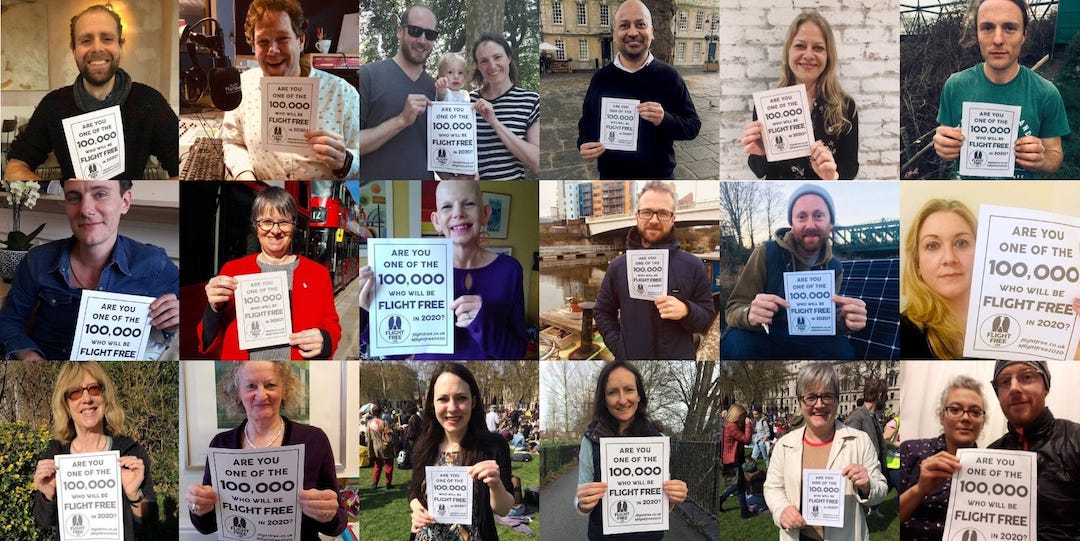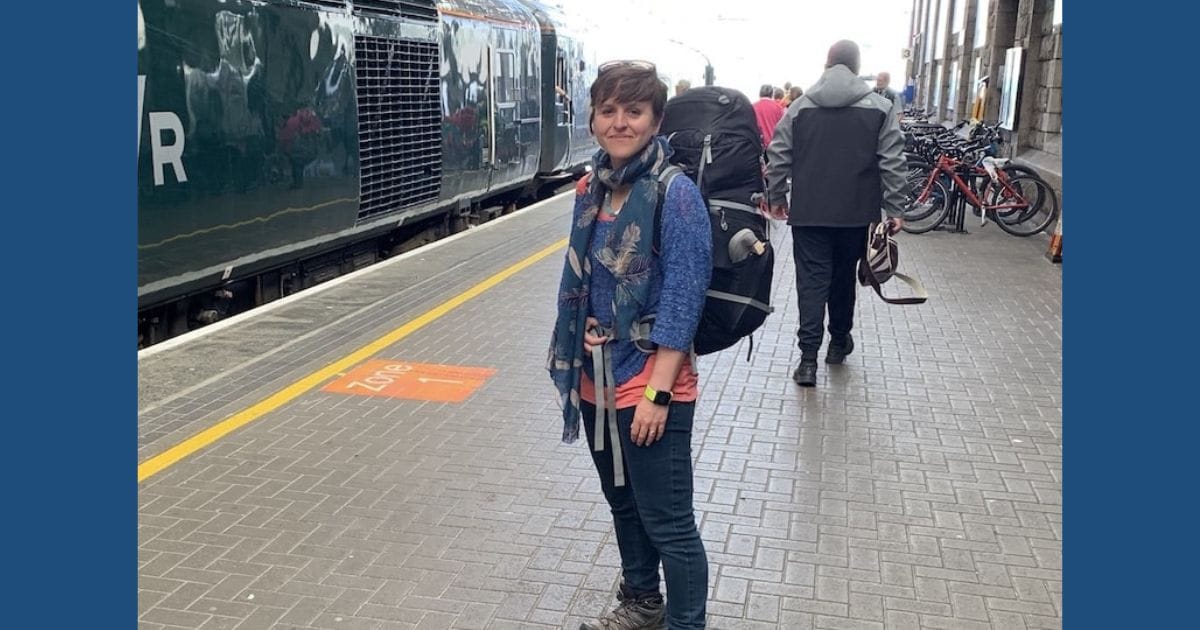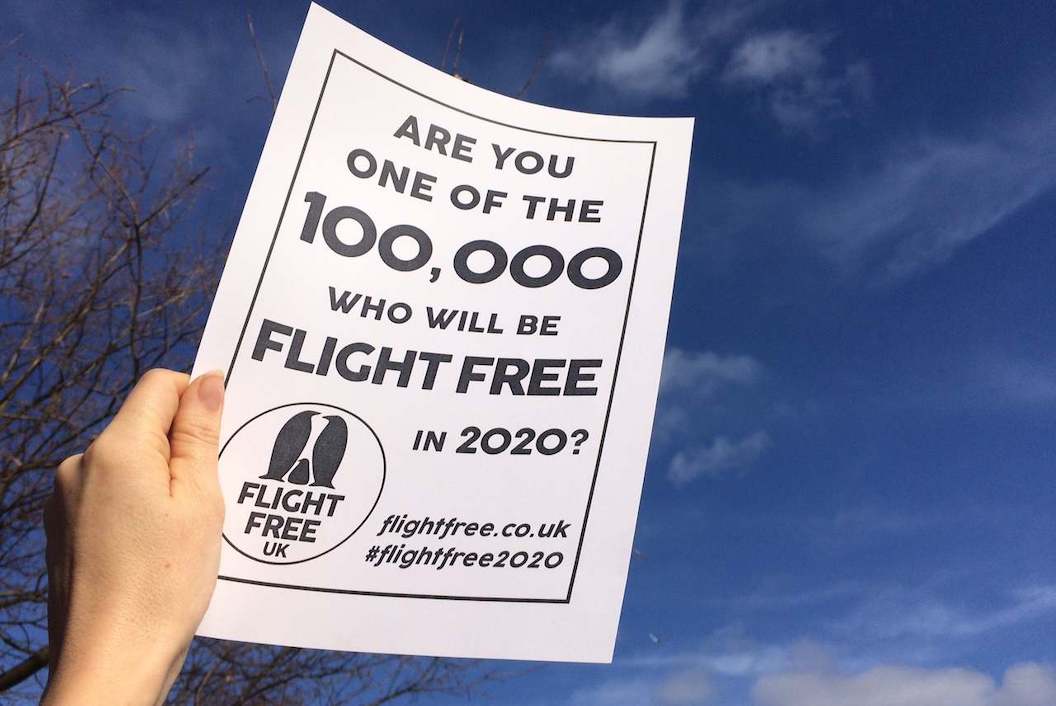In order to reach our legally-binding target of net zero by 2050, emissions from aviation need to fall.
Here at Flight Free UK we focus on individual behaviour change, but that must go hand in hand with effective government policy if we are to achieve the necessary emissions reductions.
Here are our top policies for a UK government to adopt, to help get a grip on emissions from aviation.
1. A moratorium on airport expansion
Across the UK, 20 airports have expansion plans. Each one claims the expansion will fit within our emissions reduction goals, even though the plans would result in a 59% increase in passenger numbers, contributing a further 9 mega-tonnes of CO2 annually into the atmosphere.
Airports are adept at reassuring policy makers that they can grow in an environmentally-friendly way, mainly by pointing towards carbon-neutral ground operations, improvements in fuel efficiency, and more people taking the train to the airport.
Emissions from flights themselves are consistently left out of airport expansion plans.
The Climate Change Committee states that there should be no net expansion across the UK if we are to meet our climate targets. The government should take this advice and adopt a national policy to halt all airport expansion.
2. Tax aviation fuel
Currently, there is no tax on kerosene (aviation fuel), meaning that flights are often artificially cheap especially when compared to overland transport such as trains.
The government could easily introduce a tax on fuel for domestic flights (it's harder, though not impossible, to tax the fuel on international flights as it would require reciprocation with the arrival country), and it makes sense to do so: we currently pay 50% tax on the fuel we use in our cars, so there is no reason that aviation fuel should continue to be tax-free.
Taxing aviation fuel would help level the playing field with alternative forms of transport, and it's estimated that it would cut both passenger numbers and emissions by 11%.
3. A levy on frequent flyers
A small number of people take the majority of flights: 70% of flights in the UK are taken by just 15% of the population. Introducing a frequent flyer levy would both incentivise people to fly less as well as ensuring that the polluter pays.
4. Carbon labelling at time of booking
In the same way that food items show nutritional information, carbon information given at the time of booking would help the consumer to make an informed choice.
Some flight booking sites already do this, but only by comparing flights to other flights (this counts as greenwashing, because it gives the impression that some flights are green).
Instead, flight booking websites should show average carbon emissions per passenger for each journey, compared to other transport modes such as trains, or compared to UK annual per-person emissions.
5. A ban on advertising for flights
When it became clear that smoking was a Public Health issue, the government banned the advertising of tobacco products.
Air pollution and greenhouse gas emissions from aviation are an equal, if not worse, Public Health issue. A ban on advertising for airlines would contribute to the social shift away from aviation.
6. A ban on domestic flights where there's a direct train alternative
With domestic train travel on electrified lines giving a 90% reduction in emissions compared to flying, removing certain domestic flight routes would go a long way to reducing emissions.
On routes with fast, direct trains, the rail and air times are comparable once you've factored in transfers to the airport and waiting time for check-in etc. It should therefore be possible to maintain good domestic connectivity while removing the high-carbon option.
Our recommendation is to remove flight routes where there's a direct train alternative of 4.5 hours or less. This would include routes between London and Exeter/Manchester/Newcastle/Edinburgh/Glasgow, and Birmingham and Edinburgh/Glasgow.
7. Significant investment in low-carbon transport
There are many barriers to people choosing low-carbon transport, and these need to be removed in order to facilitate the shift away from air travel. These include:
- bringing the railways back into public ownership to ensure that profits go towards improving the service rather than to shareholders
- cheaper, more consistent fares, for example removing excessive walk-on fares and keeping standard fares lower
- publishing timetables much further in advance so travellers can plan ahead and book travel earlier than the current 12 weeks
- joined-up services, for example between trains and ferries
- investing in booking platforms that simplify the booking process for multiple transport modes
- upgrade lines and rolling stock to improve reliability and speed of domestic train travel
- open up the channel tunnel to night trains, and allow competition with Eurostar to facilitate cheaper UK-EU travel




